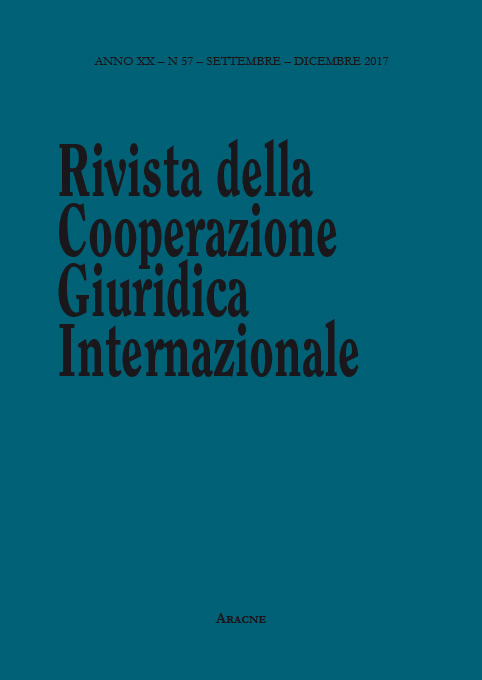Estratto da
RIVISTA DELLA COOPERAZIONE GIURIDICA INTERNAZIONALE
Quadrimestrale dell’Istituto Internazionale di Studi Giuridici
La problematica dei c.d. “accordi non vincolanti” nel diritto internazionale: un potenziale paradosso
RIVISTA DELLA COOPERAZIONE GIURIDICA INTERNAZIONALE
Quadrimestrale dell’Istituto Internazionale di Studi Giuridici
La problematica dei c.d. “accordi non vincolanti” nel diritto internazionale: un potenziale paradosso

States more frequently today tend to negotiate non-binding agreements. Through such engagements d’honneur, they see the chance to adopt common stances in order to resolve delicate diplomatic issues and avoid being anchored to the severe formalities of the law of treaties. It is common to observe in doctrine, the opinion according to which non-binding agreements should be considered excluded from the operative range of the pacta sunt servanda principle, without engaging international responsibility of the contracting States. This approach is not fully shared by those whom tend to place this phenomenon on a strictly legal level. Hence, non-binding agreements should represent soft law treaties, becoming formally indistinguishable from any other international binding agreement. This different configuration appears to be more likely advisable, owing to the fact that it is confirmed by the Vienna Convention on the Law of the Treaties, which, pointing out the meaning of the term “treaty” (art. 2), refers to any “agreement concluded between States in written form and governed by international law”. Moreover, many juridical consequences could arise from non-binding agreements as, for instance, the duty to respect the good faith rule and estoppel. Furthermore, a non-binding agreement may influence the evolution of international law, both customary and treaty law. In addition, rightful consideration should be allotted to the fact that a non-binding agreement could also fulfill a subordinate role in compliance with a clear perceptive treaty, influencing its effective implementation and interpretation. As it includes juridical norms, notwithstanding permissive ones, the provisions of a non-binding agreement will result socially ensured in any case. Definitively, governments should always observe a relevant caution when concluding any agreement, and consider that, paradoxically, even using non-binding treaty terms, they may encounter serious restrictions in their own legal domain.
| pagine: | 9-27 |
| DOI: | 10.4399/97888255089321 |
| data pubblicazione: | Gennaio 2018 |
| editore: | Aracne |








